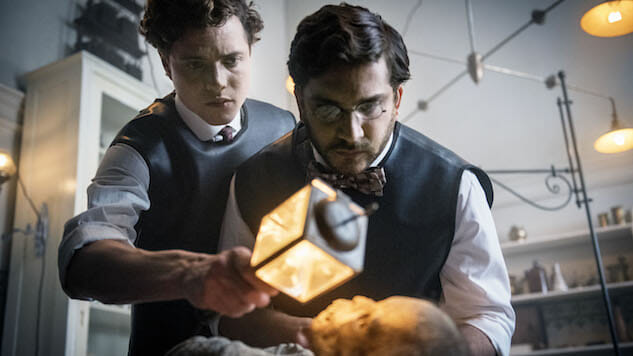TNT’s Gorgeous The Alienist Never Quite Comes to Life
Photo: Kata Vermes/TNT
There are no aliens in The Alienist. That’s the first thing you have to wrap your mind around. The second thing is that President Theodore Roosevelt is a main character, back when he was police commissioner for New York City, and he’s the most disappointing part of the show.
I don’t know about you, but I’ve never been let down by Teddy before, so the cast’s weak link comes as a surprise in the midst of the historical crime drama. The Alienist is about the invention of forensic psychology at the turn of the century (“alienists” were old-timey psychologists), and the strange combination of professions it took to sniff out the most heinous of crimes before technology allowed everyone to be as diversely specialized as need be.
This group includes alienist Dr. Laszlo Kreizler (Daniel Brühl), police secretary Sara Howard (Dakota Fanning), New York Times illustrator John Moore (Luke Evans), brother detectives Marcus and Lucius Isaacson (Douglas Smith and Matthew Shear), and Roosevelt (Brian Geraghty). Let’s get this out of the way now: Geraghty is poorly cast and delivers in kind. When you cast such a bombastic role, with such a solidified image in the American psyche, you have to play into it or undermine it hard with little-known facts. Here, Geraghty is merely milquetoast and serviceable—two things Theodore Roosevelt would’ve knocked your teeth in for if he heard you describe him as such. Aside from that, this ragtag group is pulled together by schoolmate loyalty and a common sense of justice, looking to solve the gruesome murder of a young male prostitute.
And gruesomeness is as intentional to the production as the New York name drops. TNT and director Jakob Verbruggen (who tackled the first three episodes) may weasel in a line from J.P. Morgan, but a few seconds later, that schmaltz is irreparably stained by an empty set of eye sockets. The serial killer hunting isn’t the main draw for this show, but the abject horror at this avulsion and mutilation is refreshingly intact.
True to its source, Caleb Carr’s novel of the same name, The Alienist’s most appealing parts are its pieces of historical fascination and its aesthetic dedication to replicating that fascination in a story both adventurous and studious. The group is composed of relatively soft men (and one relatively soft woman)—with ideas, words and not much else—who all stand above a world of graft and corruption run by the institutions of more traditional masculinity. This is the Gilded Age, when politics, policing, and criminal enterprise were increasingly blurred activities.
-

-

-

-

-

-

-

-

-

-

-

-

-

-

-

-

-

-

-

-

-

-

-

-

-

-

-

-

-

-

-

-

-

-

-

-

-

-

-

-








































